- Home
- H A CULLEY
WARRIORS OF THE NORTH
WARRIORS OF THE NORTH Read online
WARRIORS OF THE NORTH
By
H A Culley
Book Two about the lives and times of Oswald and Oswiu, brothers who were Kings of Northumbria, famous warriors and Saints
Published by Orchard House Publishing
First Kindle Edition 2016
Text copyright © 2016 H A Culley
The author asserts the moral right under the Copyright, Designs and Patents Act 1988 to be identified as the author of this work.
All Rights Reserved. This book may not be reproduced in any form, in whole or in part, without written permission from the author.
Cover Image: © iStock.com
Table of Contents
List of Principal Characters
Place Names
Glossary
SYNOPSIS OF THE FIRST BOOK - WHITEBLADE
CHAPTER ONE – THE BATTLE OF HEAVENFIELD
CHAPTER TWO – THE WITAN AT Yeavering
CHAPTER THREE – GODDODIN
CHAPTER FOUR – THE WITAN AT Eoforwīc
CHAPTER FIVE – THE HOLY ISLAND OF LINDISFARNE
CHAPTER SIX – THREE WEDDINGS
CHAPTER SEVEN – THE RISE AND FALL OF KINGDOMS
CHAPTER EIGHT – THE BATTLE OF GLEN MAIRSON
CHAPTER NINE – THE SAXON CONFEDERATION
CHAPTER TEN - WAR ON TWO FRONTS
CHAPTER ELEVEN – THE CLOUDS GATHER
CHAPTER TWELVE – THE BATTLE OF MASERFIELD
Historical Note
Other Novels by H A Culley
About the Author
List of Principal Characters
(In alphabetical order)
Historical characters are shown in bold type
Acha – Widow of Æthelfrith and sister of Edwin, both kings of Northumbria
Æbbe - Acha’s only daughter. Later Abbess of Ebchester and founder of Coldingham Priory.
Æthelfrith - King of Northumbria who was killed in battle in 616 AD. The father of Eanfrith, Oswald, Oswiu and their other siblings
Aidan - An Irish monk and missionary. Later Abbot and Bishop of Lindisfarne, he is credited with converting Northumbria to Christianity
Cadwaladr – Cadwallon’s son
Cadwallon ap Cadfan – King of Gwynedd
Cewalh – Cynegils’ eldest son, King of Wessex from 642
Congal Cláen – Nephew of Eochaid. King of the Ulaidh in Ulster
Cyneburga – Cynegils’ daughter, later Queen of Northumbria
Cynegils – King of Wessex until 642
Dòmhnall mac Áedo – High King of Ireland, a member of the southern Uí Néill
Domnall Brecc – King of Dalriada
Domangart – Domnall’s eldest son
Dudda – Eorl of Norhamshire and one of Oswald’s counsellors
Dunstan – Oswald’s horse marshal and a member of his gesith (bodyguard)
Eanfrith – Oswald’s half-brother, King of Bernicia in 633 AD
Edwin – Acha’s brother who usurped the throne of Northumbria. Killed by Penda and Cadwallon in 633 AD
Edwy – A Mercian boy and Oswald’s current body slave
Eochaid Iarlaithe mac Lurgain – Son of the late King Fiachnae of the Ulaidh, close friend of Oswald’s
Eowa – The elder brother of King Penda; lord of Northern Mercia
Ethelbald – Sometime custos (garrison commander) of Bebbanburg.
Fianna – The daughter of a farmer on Bute who Oswiu took as his lover
Beorhtwulf – A young warrior who became one of Oswald’s gesith
Hengist – One of Oswald’s gesith, later Sub-king of Lindsey
Hrothga – Eorl of Eoforwīc
James the Deacon – A Roman Catholic missionary in Deira; later canonised
Jarlath – A captured Irish boy; now one of Oswald’s gesith, later its captain
Keeva – Jarlath’s sister, Oswald’s mistress
Kenric – A member of Oswiu’s gesith, later Eorl of Dùn Barra in Goddodin
Œthelwald – Oswald’s son; later King of Deira
Offa – Oswald’s youngest brother, a monk and an anchorite
Osguid – Oswald’s next eldest brother
Oslac – Another of Oswald’s brothers, later his chaplain
Owain map Belin – King of Strathclyde
Oswald – Second son of Æthelfrith of Bernicia and eldest son of Acha of Deira. King of Northumbria. A noted warrior and ruler who, with Aidan, spread Christianity throughout Northumbria
Oswiu – One of Oswald’s younger brothers who became King of Rheged, Bernicia and Northumbria in turn. A devoted Christian who established a number of monasteries
Penda – King of Mercia, a pagan
Peada – His son, King of Middle Anglia as his father’s vassal
Raulf – Ethelbald’s son and Oswiu’s body slave
Rhieinmelth – Princess of Rheged and heiress to its throne.
Ròidh – A Pictish prince who became Aidan’s acolyte
Rònan – A captured Pict who became one of Oswald’s gesith
Ségéne mac Fiachnaíhe – Abbot of Iona
Sigbert – A captured Deiran boy
Place Names
(In alphabetical order)
I find that always using the correct place name for the particular period in time may be authentic but it is annoying to have to continually search for the modern name if you want to know the whereabouts of the place in relation to other places in the story. However, using the ancient name adds to the authenticity of the tale. I have therefore compromised by using the modern name for cities, towns, settlements and islands except where the ancient name is relatively well known, at least to those interested in the period, or is relatively similar to the modern name. The ancient names used are listed below:
Bebbanburg – Bamburgh, Northumberland
Bernicia – The modern counties of Northumberland, Durham, Tyne & Wear and Cleveland in the North East of England. At times Goddodin was a subsidiary part of Bernicia.
Berwic – Berwick upon Tweed
Caer Luel – Carlisle in Cumbria
Caledonia - Scotland
Cantwareburg – Canterbury, Kent, England
Dalriada – Much of Argyll and the Inner Hebrides
Deira – Most of North Yorkshire and northern Humberside
Dùn Add – Dunadd, near Kilmartin, Argyll, Scotland. Capital of Dalriata.
Dùn Barra - Dunbar, Scotland
Dùn Breatainn - Literally Fortress of the Britons. Dumbarton, Scotland
Dùn Èideann - Edinburgh
Dùn Phris - Dumfries, south-west Scotland
Eoforwīc - York
Elmet – West Yorkshire
German Ocean – North Sea
Gleawecastre – Gloucester, England
Goddodin – The area between the River Tweed and the Firth of Forth; i.e. the modern regions of Lothian and Borders in Scotland.
Gwynedd – North Wales including Anglesey
Hamwic – Southampton, Hampshire, England
Isurium Brigantum - Aldborough in Yorkshire
Legacæstir – Chester, England
Lundenwic – London
Maserfield – Oswestry in Shropshire, England
Mercia – Roughly the present day Midlands of England
Northumbria – Comprised Bernicia, Elmet and Deira. At times it also included Rheged and Goddodin
Oxenforda – Oxford, England
Pictland – The confederation of kingdoms including Shetland, the Orkneys, the Outer Hebrides, Skye and the Scottish Highlands north of a line running roughly from Skye to the Firth of Forth
River Twaid – The river Tweed, which flows west from Berwick through northern Northumberland and the Scottish Borders.
Rheged - A kingdom of Ancient Britons speaking Cumbric, a Brythonic language similar to Old Welsh, which roughly encompassed modern Lancashire, Cumbria in England and, at times, part of Galloway in Scotland
Wintan-ceastre - Winchester, Hampshire, England
Weorgoran-ceastre – Worcester, England
Glossary
Ætheling – Literally ‘throne-worthy. An Anglo-Saxon prince.
Birlinn – A wooden ship similar to the later Scottish galleys. Usually with a single mast and square rigged sail, they could also be propelled by oars with one man to each oar.
Brenin – The Brythonic term by which kings were addressed Wales, Strathclyde, Rheged and the Land of the Picts.
Bretwalda - In Anglo-Saxon England, an overlord or paramount king accepted by other kings as their leader
Currach - A boat, sometimes quite large, with a wooden frame over which animal skins or hides are stretched and greased to make them waterproof.
Custos – A guardian or custodian, the word was used in a variety of contexts including to mean one left in charge in the absence of the lord or king.
Cymru - Wales
Cyning – Old English for king and the term of respect by which they were normally addressed.
Eorl – A noble ranking between thegn and members of the royal house. In the seventh century it meant the governor of a division of the kingdom. Later replaced by ealdorman, the chief magistrate and war leader of a county, and earl, the ruler of a province under the King of All England; for example, Wessex, Mercia and Northumbria.
Gesith – The companions of a king, usually acting as his bodyguard.
Hereræswa – Military commander or general. The man who commanded the army of a nation under the king.
Mile Castle – A Roman fort built at intervals of one mile all along Hadrian’s Wall.
Seax – A bladed weapon somewhere in size between a dagger and a sword. Mainly used for close-quarter fighting where a sword would be too long and unwieldy.
Thegn – The lowest rank of noble. A man who held a certain amount of land direct from the king or from a senior nobleman, ranking between an ordinary freeman and an eorl.
Ulaidh - A confederation of dynastic-groupings that inhabited a provincial kingdom in Ulster (north-eastern Ireland) and was ruled by the Rí Ulad or King of the Ulaidh. The two main tribes of the Ulaidh were the Dál nAraidi and the Dál Fiatach.
Uí Néill – An Irish clan who claimed descent from Niall Noigiallach (Niall of the Nine Hostages), a famous High King of Ireland who died about 405 AD.
Settlement – Any grouping of residential buildings, usually around the king’s or lord’s hall. In 7th century England the term city or town normally referred to former Roman conurbations and village had not yet come into use.
Síþwíf - My lady in Old English.
Witan – The council of an Anglo-Saxon kingdom. Its composition varied, depending on the matters to be debated. Usually it consisted of the Eorls and the chief priests (bishops and abbots in the case of a Christian kingdom), but for the selection of a king or other important matters, it would be expanded to include the more minor nobility, such as the thegns.
Villein - A peasant (tenant farmer) who was legally tied to his vill.
Vill - A thegn’s holding or similar area of land in Anglo-Saxon England which would later be described as a parish or manor.
SYNOPSIS OF THE FIRST BOOK - WHITEBLADE
Woken in the middle of the night to flee the fortress of Bebbanburg on the Northumbrian coast, the twelve year old Prince Oswald escapes his father’s killer, Edwin, to establish a new life for himself on the West Coast of Scotland. He becomes a staunch Christian on Iona and trains to be a warrior.
He makes a name for himself in the frequent wars in Ulster and in a divided Scotland, earning himself the nickname of ‘Whiteblade’ and establishing himself as the greatest war leader in his adopted homeland. However, he is beset by enemies on all sides and is betrayed by those he should be able to trust the most.
After playing a leading role in deposing the treacherous Connad, King of Dalriada, he helps his successor to extend Dalriada to include the Isles of Skye, Arran and Bute. When King Edwin is killed in battle and those who try to succeed him are also killed by Cadwallon and his invading Welsh army, Oswald decides that his moment of destiny has arrived; he sets out with his warriors to confront Cadwallon and win back the throne of Northumbria.
CHAPTER ONE – THE BATTLE OF HEAVENFIELD
June 634 AD
Oswald had anchored his left flank on the cliff face known as Brady’s Crag and the right against the old Roman Wall. Satisfied that he couldn’t be outflanked he stood and studied the opposing army. Cadwallon with his three hundred Welsh tribesmen and a hundred battle-hardened Mercian warriors had occupied the low ridge to the east, blocking his route into Bernicia.
‘What do you make of them?’
The speaker was his brother Oswiu who, at twenty two, was nearly as experienced a fighter as Oswald. Both had learned their trade in the service of the King of Dalriada on the west coast of Caledonia and in Ulster fighting for the Ulaidh against the Uí Néill.
‘They outnumber us but few of the Welshmen have any armour; not even helmets. They have fewer archers too. Against that, the hundred Mercians are all wearing either chain mail byrnies or thick leather jerkins and helmets. I suspect that all of them are trained warriors. However, our men from Dalriada are hardy fighters and have fought with us before. Against that, the Ilesmen and the men of Rheged are more of an unknown quantity and they amount to half our numbers.’
‘The men from Rheged are also unarmoured and look little different to the Welsh,’ Oswiu added.
‘They and the Welsh are both Brythonic tribesmen. Thankfully our men don’t paint their bodies with those peculiar blue whorls or lime their hair, otherwise we’d have trouble telling them apart.’
The speaker was another of Oswald’s brothers, a monk from Iona called Oslac. He and another brother called Osguid had accompanied Oswald with a few of the warriors who protected the monastery on Iona. They had erected a large wooden cross at the centre of the line and had just finished blessing the army to inspire them.
‘Well, it doesn’t look as if Cadwallon is going to make the first move,’ Rònan observed.
He was the son of a Pictish King from Lewis who had been captured as a boy and had been Oswald’s body slave for a time. Now freed and trained as a warrior, he was one of the dozen close companions who formed Oswald’s gesith.
‘No, I think you’re right. Well, if he’s not going to attack first voluntarily, we’ll have to provoke him into doing so. Take up your positions, I’m going to send the archers forward.’
‘You’ll need your helmet then.’
Jarlath, another of the gesith who was the brother of Oswald’s mistress, Keeva, handed him a prime example of the smith’s trade. The crown was made from a single piece of steel to which a chain mail aventail had been attached to protect the neck and a piece of metal with two holes had been riveted to the front rim to protect the eyes and nose. It was decorated with a circlet of gold around the rim and a crest of gold running fore and aft.
The two smiled at one another. Jarlath was another former body slave, this time from Ireland, who continued to serve in that capacity despite the fact that Oswald had freed him some time ago and, at sixteen, he’d just completed his training as a warrior. He too was part of Oswald’s gesith.
Oswald put on his helmet and then took his shield from his eleven year old son.
‘Thank you, Œthelwald, now go to the rear where the baggage train is and wait there until I send for you. Do you understand?’
‘Why can’t I stay and fight by your side, father?’
‘Because you have yet to be trained to fight and you know you can’t start that for three years yet, when you’ll be much bigger. Now go, you’re distracting me from the battle.’
Jarlath gripped the boy’s shoulder. ‘I’ll come with you to make sur
e you get there safely.’
A year ago Œthelwald would have told Jarlath rudely that he didn’t need him to look after him. He had despised the youth for being a former slave, but he had matured somewhat since then and instead he nodded his thanks and went with Jarlath.
‘Don’t kill them all; leave some for me. I’ll be back as quickly as I can,’ the latter called over his shoulder as he followed Œthelwald towards where the pack animals, horses, livestock and carts were housed in and around one of the old mile castles on the Roman Wall.
Twenty of the older men had been detailed to protect it, as well as the men from Rheged who were the drivers of the carts and drovers of the livestock which had been brought along to feed Oswald’s host. Jareth handed Œthelwald over to the man in charge and ran back towards the battlefield.
When he got there he saw that the archers had advanced to within eighty yards of the enemy line and were pouring a steady stream of arrows into them. Some aimed directly at the front rank and others sent theirs at high trajectory into the rear ranks. The enemy archers were responding but there were far fewer of them and Oswald had sent a warrior forward with each archer to protect him with his large round shield. By comparison the Welshmen carried much smaller shields, called targes, which did little to protect them. Only the Mercians in the centre had shields similar to those carried by most of Oswald’s men.
Finally the irate Welshmen had had enough and a whole section of them broke the line. They ran towards their tormentors in a disorganised mass. The archers beat a hasty retreat and the line of warriors opened up to allow them through, then closed ranks and brought their shields into position so that they overlapped it with that of the man next to them. This left only their eyes and lower legs exposed. However, the Welsh thought that they had a surprise in store for them. A yard of so from the shield wall half of them knelt down on one knee with their backs bent and head tucked in and the rest, all armed with daggers and seaxes, used them as spring boards to leap high in the air and come down several ranks deep into Oswald’s army.

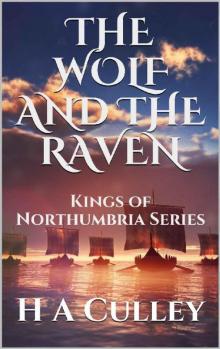 The Wolf and the Raven
The Wolf and the Raven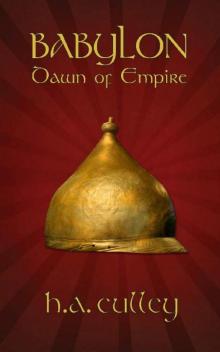 Dawn of Empire
Dawn of Empire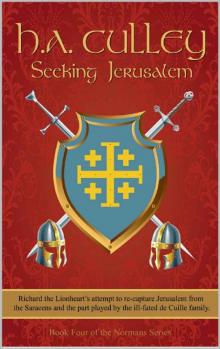 Seeking Jerusalem
Seeking Jerusalem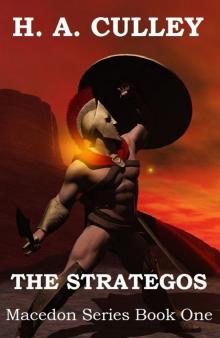 The Strategos
The Strategos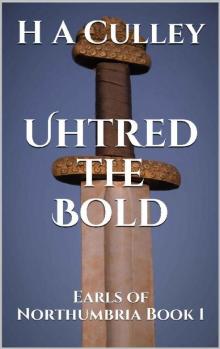 Uhtred the Bold
Uhtred the Bold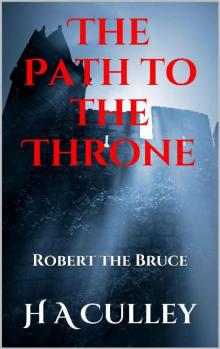 The Path to the Throne
The Path to the Throne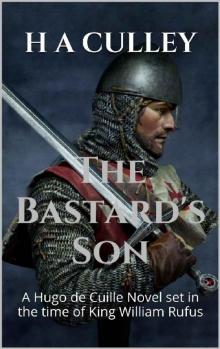 The Bastard's Son
The Bastard's Son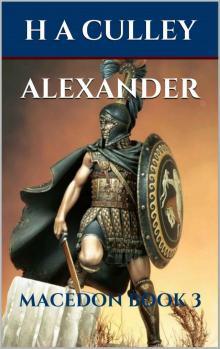 Alexander
Alexander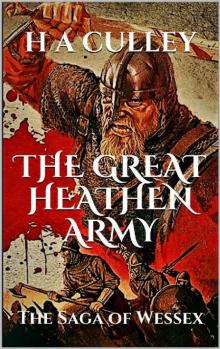 The Great Heathen Army
The Great Heathen Army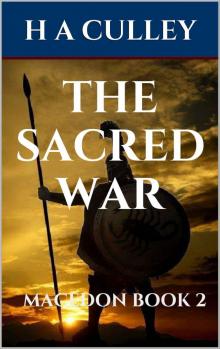 The Sacred War
The Sacred War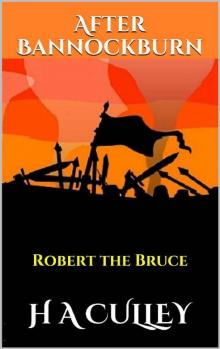 After Bannockburn
After Bannockburn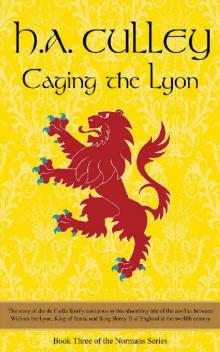 Caging the Lyon
Caging the Lyon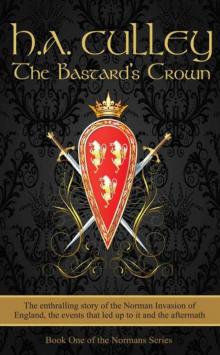 The Bastard's Crown
The Bastard's Crown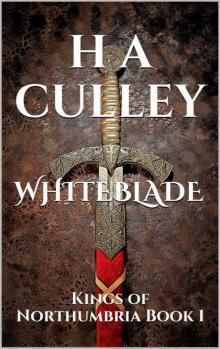 WHITEBLADE
WHITEBLADE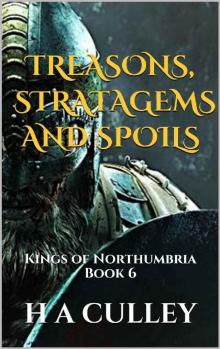 TREASONS, STRATAGEMS AND SPOILS: Kings of Northumbria Book 6
TREASONS, STRATAGEMS AND SPOILS: Kings of Northumbria Book 6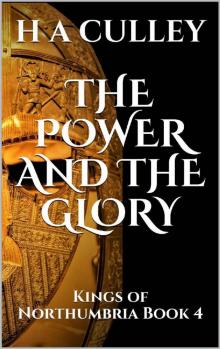 THE POWER AND THE GLORY: Kings of Northumbria Book 4
THE POWER AND THE GLORY: Kings of Northumbria Book 4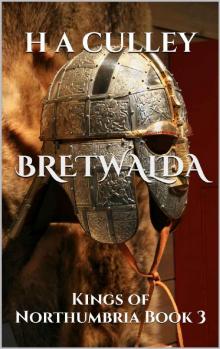 BRETWALDA: Kings of Northumbria Book 3
BRETWALDA: Kings of Northumbria Book 3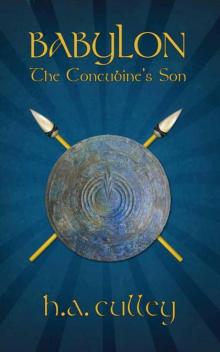 The Concubine's Son
The Concubine's Son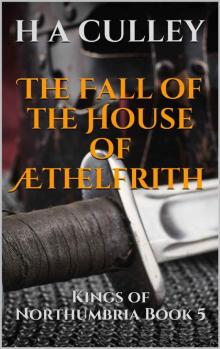 The Fall of the House of Æthelfrith: Kings of Northumbria Book 5
The Fall of the House of Æthelfrith: Kings of Northumbria Book 5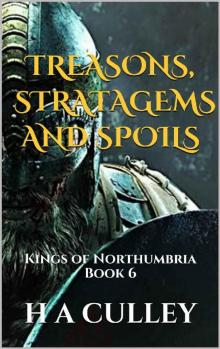 TREASONS, STRATAGEMS AND SPOILS
TREASONS, STRATAGEMS AND SPOILS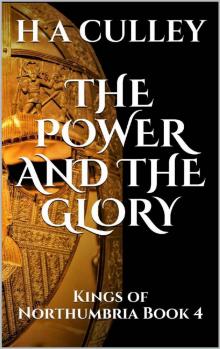 THE POWER AND THE GLORY
THE POWER AND THE GLORY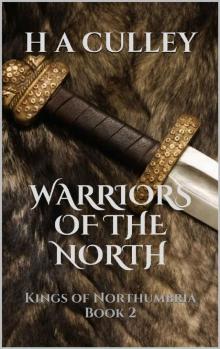 WARRIORS OF THE NORTH
WARRIORS OF THE NORTH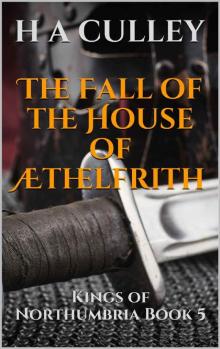 The Fall of the House of Æthelfrith
The Fall of the House of Æthelfrith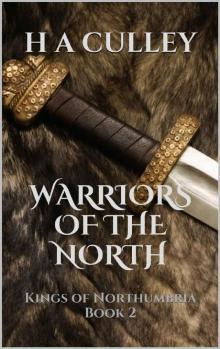 WARRIORS OF THE NORTH: Kings of Northumbria Book 2
WARRIORS OF THE NORTH: Kings of Northumbria Book 2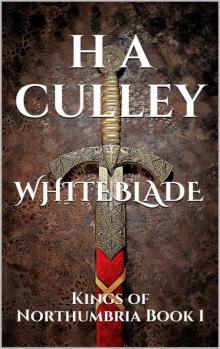 WHITEBLADE: Kings of Northumbria Book 1
WHITEBLADE: Kings of Northumbria Book 1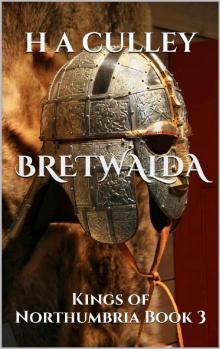 BRETWALDA
BRETWALDA